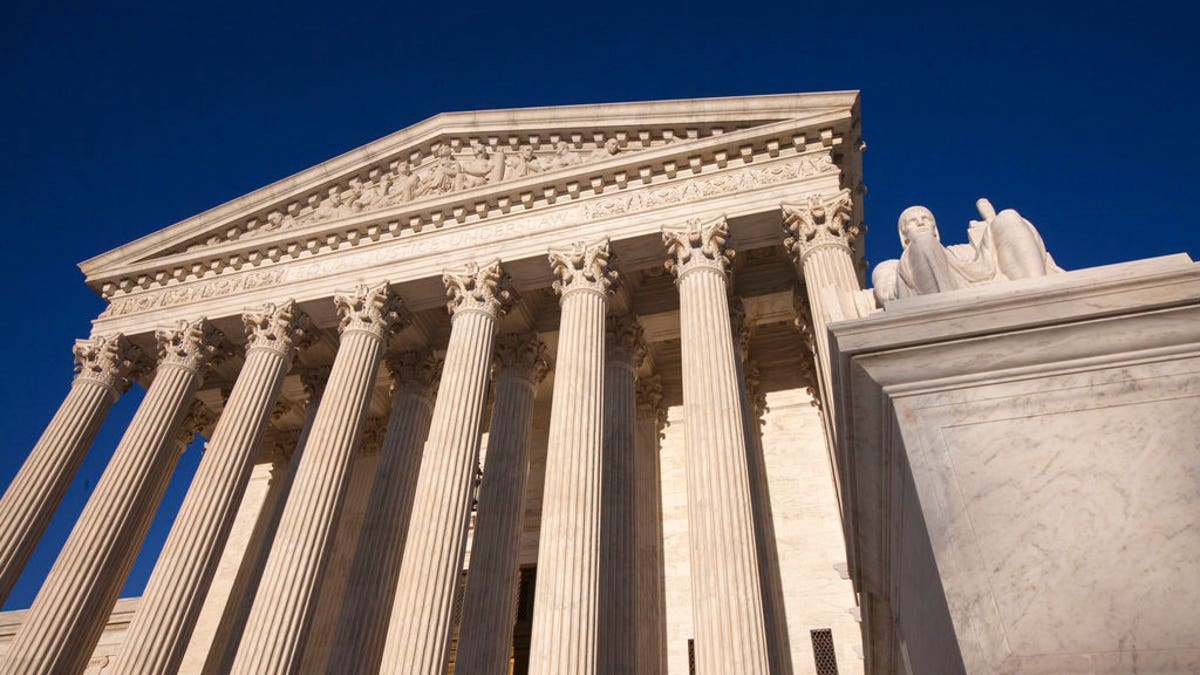
Oral arguments will be held this week at the Supreme Court on President Trump's so-called travel ban. (AP)
Should the government be able to force you to advocate for things you believe are harmful? Consider the outrage if vegetarian nutritionists were forced to extoll the health benefits of beef or if breast-feeding advocates in the La Leche League had to recommend baby formula or if anti-war protestors had to mention Army recruitment. That kind of government interference in free speech would be seen as ridiculous if applied to such passions. But people opposed to abortion face such pressure now in California.
This week, attorneys will go before the Supreme Court of the United States to defend the First Amendment rights of pro-life clinics in the State of California. Most of us have heard of a gag order, where a court orders someone to stay quiet, but new on the scene of speech lately are compelled speech orders, which require people to advocate for things despite their passionately held convictions. This Orwellian campaign puts the bully in bully pulpit, as it attempts to co-opt almost every pro-life conversation.
Since 2016, pro-life clinics in California have been unconstitutionally compelled to make statements that violate their beliefs, such as posting advertisements for state-funded abortions in their care centers and including notices designed by the state to delegitimize the services these clinics offer to pregnant women. Attorneys from Alliance Defending Freedom (ADF) argued on behalf of the 140 California pro-life clinics represented by the National Institute for Family and Life Advocates (NIFLA) at the district and federal circuit court levels to no avail, forcing ADF to go all the way to the Supreme Court for arguments that begin on March 20th.
The discriminatory actions by the California government eviscerate the First Amendment protections that American citizens enjoy under the Constitution of the United States. And the implications of the Supreme Court case extend far beyond pro-life clinics and far beyond the State of California. NIFLA’s Vice President of Legal Affairs, Anne O’Connor, summarized the threat that the California law poses to the broader culture, saying: “...if the government can successfully force pro-life pregnancy centers to promote abortion, which organizations will be targeted next? Conservative advocacy groups? Conservative news agencies? Conservative colleges? Religious organizations? Houses of worship?”
The only thing standing between governments like California’s and the rights of pro-life students to express and act on their pro-life beliefs is the First Amendment of the U.S. Constitution.
Indeed, the breakdown of First Amendment protections for a disliked group of citizens - in this case, pro-life advocates - could extend to any group advocating a worldview not shared by the majority in any given local, state, or federal government. That includes pro-life student organizations on school campuses and programs designed to assist pregnant and parenting students with life-affirming resources. California has been abundantly clear in communicating that it considers abortion a social good for its citizens. The only thing standing between governments like California’s and the rights of pro-life students to express and act on their pro-life beliefs is the First Amendment of the U.S. Constitution.
The case against pro-life advocates in California speaks to the growing efficacy of their pro-life efforts in an environment where the pro-abortion influence of powerful elites typically prevails. The pro-abortion movement in California is so desperate to regain ground lost to the efforts of pro-life advocates that it went so far as adopting blatantly unconstitutional legislation. “It’s a textbook example of several paradigms that offend the First Amendment,” said John D. Hagen at The Weekly Standard. “It compels speech. It discriminates among viewpoints. It deliberately burdens a viewpoint which is disliked by people in power.”
Students For Life of America (SFLA) chapters across the country are dealing with attacks on free speech almost daily. Across the country, school officials and sometimes student government leadership tells SFLA chapters that they can be refused recognition as a group, denied funding, denied permission to hold an event or forced to hang signs with a “Trigger warning”, cautioning students that pro-life speech is taking place. Our displays are vandalized, and our volunteers have even been attacked. We also have experienced pressure to include pro-abortion speech in our presentations, such as when an SFLA chapter at the University of Colorado-Boulder invited pro-life activist and former Planned Parenthood clinic director Abby Johnson to speak. The school’s cultural events board tried to pressure the students to include a Planned Parenthood advocate at their event, eventually relenting only after legal intervention.
We take pride in knowing that the pro-life movement in 2018 is so effective that it riles up California elites. And we simultaneously recognize the critical importance of the outcome of NIFLA v. Becerra at the Supreme Court, as Students for Life of America has more than 90 chapters on college and high school campuses in California, and more than 1,200 nationwide in all 50 states.
Known to have a love-hate relationship with the press, even President Thomas Jefferson understood that government can overstep when it comes to free speech. Jefferson once said: “The functionaries of every government have propensities to command at will the liberty and property of their constituents. There is no safe deposit for these but with the people themselves, nor can it be safe with them without information.”
Given the stakes for all who depend on the First Amendment, Students for Life of America throws our wholehearted support behind the pro-life advocates who are being unjustly targeted in California and stands with them in their fight to maintain the rights already guaranteed us all in the U.S. Constitution. People advocating a choice, such as choosing life for a preborn infant, should not be targeted by the government.
